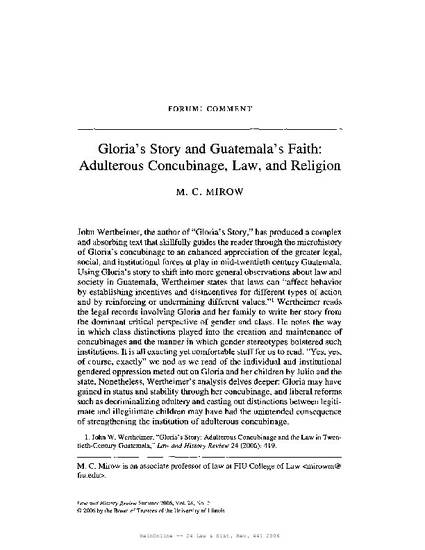
Article
Gloria’s Story and Guatemala’s Faith: Adulterous Concubinage, Law, and Religion
Law & Hist. Rev.
(2006)
Abstract
John Wertheimer, the author of “Gloria’s Story,” has produced a complex and absorbing text that skillfully guides the reader through the microhistory of Gloria’s concubinage to an enhanced appreciation of the greater legal, social, and institutional forces at play in mid-twentieth century Guatemala. Using Gloria’s story to shift into more general observations about law and society in Guatemala, Wertheimer states that laws can “affect behavior by establishing incentives and disincentives for different types of action and by reinforcing or undermining different values.”1 Wertheimer reads the legal records involving Gloria and her family to write her story from the dominant critical perspective of gender and class. He notes the way in which class distinctions played into the creation and maintenance of concubinages and the manner in which gender stereotypes bolstered such institutions. It is all exacting yet comfortable stuff for us to read. “Yes, yes, of course, exactly” we nod as we read of the individual and institutional gendered oppression meted out on Gloria and her children by Julio and the state. Nonetheless, Wertheimer’s analysis delves deeper: Gloria may have gained in status and stability through her concubinage, and liberal reforms such as decriminalizing adultery and casting out distinctions between legitimate and illegitimate children may have had the unintended consequence of strengthening the institution of adulterous concubinage.
Keywords
- Gender and Class,
- Law and Society,
- Latin America
Disciplines
Publication Date
2006
DOI
doi:10.1017/S0738248000003394
Citation Information
M. C. Mirow (2006). Gloria's Story and Guatemala's Faith: Adulterous Concubinage, Law, and Religion. Law and History Review, 24, pp 441-446. doi:10.1017/S0738248000003394.
